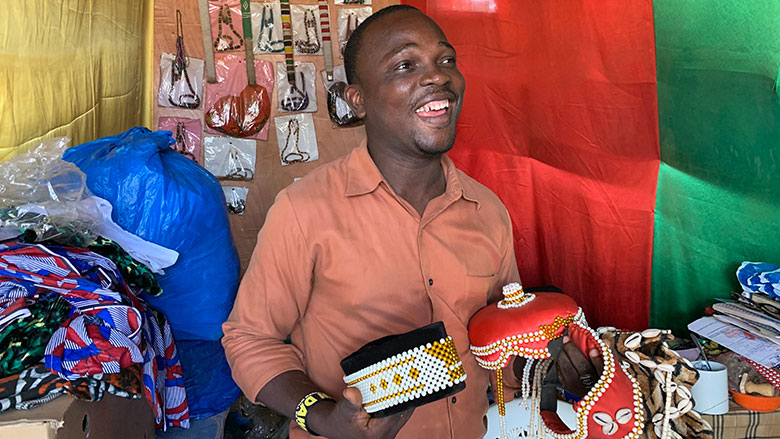MONROVIA, June 13, 2019 – Former refugee Prince Salleh, orphaned in Nigeria at the age of nine, relocated to his home country of Liberia in 2004 at the end of the civil war. Back home, with no family and little opportunities, Salleh made his living for years as a hawker on the streets of Monrovia.
His life changed in 2018 when he received a call that he was selected to participate in a program supported by the Liberia Youth Opportunities Project (YOP). With several business trainings, including money management, book keeping, market research and sales, he and seven young Liberians started The Ambassadors of Success Interior and Event Decoration Center, a business he now leads as the manager. The group used the start-up grants provided by YOP, among others, to rent a small shop, purchase materials and phone credits.
“I am living my dreams,” Salleh said.
Salleh is one of 786 Liberian youth currently benefiting from the Household Enterprise Support (HES), sub-component of the YOP. Launched in January 2017, YOP aims to improve access to income generation opportunities for targeted youth and strengthen the government’s capacity to implement its cash transfer program. The HES sub-component will support about 3,000 vulnerable youth in groups with on-the-job apprenticeships, formal vocational training, tools/equipment, basic business management training, and start-up grants.
“The Ebola crisis put a halt to the economic growth following the end of the civil war, and the Liberian economy is still struggling to fully recover and generate enough jobs for its young workforce,” said Victoria Strokova, World Bank Senior Economist and co-Task Team Leader of the project. “Projects such as YOP help to create income generating opportunities for youth, which is a high priority for the government.”
The first round of HES implementation led to the creation of 99 small youth-led businesses in Paynesville, Central Monrovia and New Kru, which are some of the most populated communities in the country.
Ninietta Mulbah, a 29-year-old woman managing a tailoring business, has also benefitted from the program.
“Before joining YOP, I did not have any skills in doing business, but now I can manage a business and I can create income for myself and my family,” she said. Like Salleh, Mulbah also leads her youth business group, who together run a small tailoring shop in Redlight, one of the biggest markets in Liberia.
Annie Doe, 25, who is part of Mulbah’s business group, is responsible for training and sales. Annie has trained the group members in tailoring and is looking forward to providing similar training to other youth around their shop who is seeking for such opportunity.
“We want the business to grow,” she said. “We want to help our fellow youth and we want to expand our business.”
YOP has begun rolling out the second phase of the program in May 2019. Under round two, additional 1,500 youth in 15 communities in Greater Monrovia area will be given business startup grants in addition to the financial management skills training, and some youth will also have an opportunity to engage in technical and vocational training in chosen vocations.
YOP includes two other programs directly benefiting young Liberians; the Pre-Employment Social Support Program (PESS) for urban youth and the Productive Public Works and Life Skills Support (PPW) for rural youth. Under PESS, 2,000 Liberian youth aged 15-17 years in Monrovia will gain understanding of the job market and receive trainings on sexual and reproductive health and psychosocial support to influence behavior and competency in making the right decisions to succeed in the labor market.
The PPW component targets 10,000 youth aged 18-35 years in rural areas in all counties across Liberia, providing farming inputs, tools and financial management skills training and facilitating linkages between production, processing and marketing.


